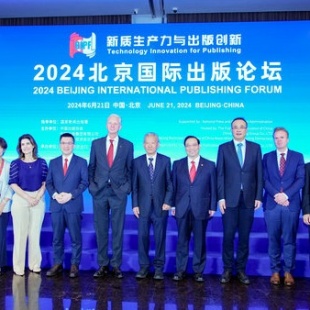Technology takes center stage at Beijing publishing forum


The 2024 Beijing International Publishing Forum, held on June 21 at the China National Convention Center, explored the theme of "Technology Innovation for Publishing". Organized by China National Publications Import & Export (Group) Corporation, the event brought together experts, scholars and professionals from publishing and tech industries, both domestic and international.
With over 200 participants from around the world, the forum offered a comprehensive platform to discuss innovation, trends, and technological applications within the publishing landscape.
In his keynote speech, Wu Shulin, president of the Publishers Association of China, said that innovation is the essential characteristic of publishing and the fundamental driving force behind its iterative development.
As the publishing industry actively embraces new quality productive forces and pursues innovative development, it will inevitably face challenges and tests related to technological transformation and copyright protection, he said.

He suggested that publishing companies should prioritize technological innovation and digitalization to improve efficiency and provide seamless access for readers. They should also focus on copyright protection, optimizing industrial structures, enhancing academic standards, exploring international cooperation, and cultivating talent to invigorate the industry's development.
Zhang Zehui, director of the Import and Export Administration Bureau of National Press and Publication Administration, emphasized that global collaboration and high-quality production are key to advancing publishing. He urged publishers to develop new models and leverage their resources to drive growth in the digital age.
Chang Bo, president of China Publishing Group, introduced several corpora under the group and the first ancient book collation large model, the "Xunzi" Ancient Book Large Language Model. Based on this, he proposed fully utilizing new technologies to drive content innovation, channel expansion, and process reshaping to better cultivate new quality productive forces in the publishing industry.
Karine Pansa, president of the International Publishers Association, said that publishers have always been innovating and actively embracing new technologies.
However, amid the focus on digitalization and artificial intelligence, it is important not to forget that readers still love physical books. As a result, reforms and innovations in publishing must aim to produce better books to guide and serve readers who enjoy sitting down with a good book, she said.
In their keynote speeches, industry leaders including Alexander Broich of Cengage Select, Zhang Jiuzhen from Peking University, Arnout Jacobs of Springer Nature Greater China, Shen Jian of Xinhua Publishing House, Maurits van den Boogert of De Gruyter Brill, and Shao Dan of CNPIEC UNTRO Ltd discussed how new technologies like AI are transforming publishing. They emphasized the need for innovation, digital integration, and high-quality development. Key strategies include cultivating versatile talent and establishing guidelines for ethical AI use to address copyright and other issues, ensuring technology boosts the publishing industry effectively.





































